What is this guide?
This is a guide to understanding law firm pay per click advertising (PPC) strategy and its alternatives.
Who is this guide for?
Attorneys who are considering pay per click and other marketing strategies to drive new business to their firm.
What will I learn and be able to do with this information?
In this guide, you’ll learn:
- what pay per click is and how to use it
- what other strategies exist
- what to look for in an agency who can carry out these strategies
%20(1)-small-1.jpeg?width=724&name=apple-business-computer-connection-392018%20(1)%20(1)-small-1.jpeg)
Pay per click: a proven way to attract new business
Law firms have long relied heavily on referrals and word of mouth to attract business.
While these are still popular ways to find a lawyer today, when prospects find themselves in legal trouble, they often turn to Google to research lawyers nearby.
In fact, according to a 2019 Martindale-Avvo survey, (via their blog post), 43% of law firm clients said they used referrals to find an attorney, 43% said they used Google, and 46.5% said they used listing and review sites like Avvo or Yelp.
This suggests that almost half of clients search for attorneys online.
Since “46% of clicks go to the top three paid ads” on the search results page (SEO Tribunal), and ads allow you to pay for these top spaces, pay per click advertising can be a useful marketing tool for lawyers.
Pay per click can be a useful advertising method in the legal industry because it makes it easy for law firms to reach potential customers at a moment when they are likely to need legal services: when they search for help on Google.
Relatively few law firms report using Google Ads (just 7–9% according to the American Bar Association in 2019—no mention was made of it in the ABA's 2020 report—yet those who do compete to appear at the top of result pages in the hopes of drawing potential clients.
In today’s digital atmosphere, law firms that don’t take advantage of PPC or other digital marketing strategies may be missing out on an opportunity to reach potential clients—and lose them to savvier competitors.
What is PPC for lawyers and how does it work?
What is PPC?
PPC stands for “pay per click.” This is a form of advertising where you can pay for your ad to appear on the first page of search engine results pages when someone searches for a certain keyword, such as “owi wisconsin.”
PPC is also known as “search engine marketing (SEM),” and “paid search” because every time someone clicks on your ad, you pay the search engine a certain amount of money.
Google is the most important search engine because it holds “about 92% of the global search engine market” (HubSpot). When we talk about paid search ads, we are usually talking about PPC ads on Google.
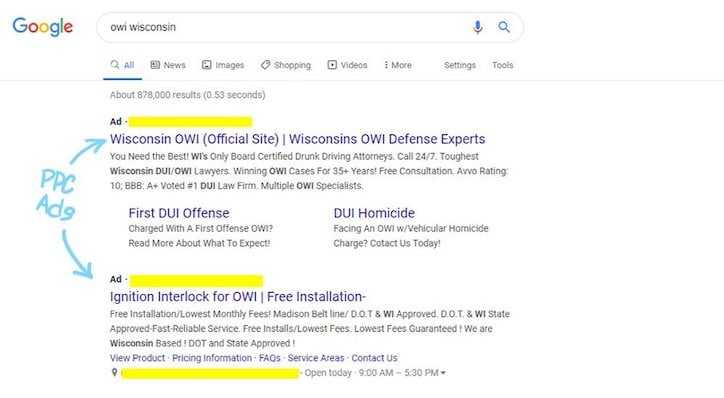
Source: Google
How does PPC work for lawyers?
PPC advertisers participate in an automated “auction” which occurs every time someone types a keyword into the search bar.
Different law firms each place a “bid” for a certain amount of money on a particular keyword. This bid is the maximum amount they’re willing to spend when someone clicks on their ad. Let’s say you want to bid on the keyword “owi wisconsin.”
You’re competing for the top listings on the first page of Google after someone types in “owi wisconsin.” Whoever is willing to pay the most every time someone clicks on the ad can increase their ability to appear in the top position.
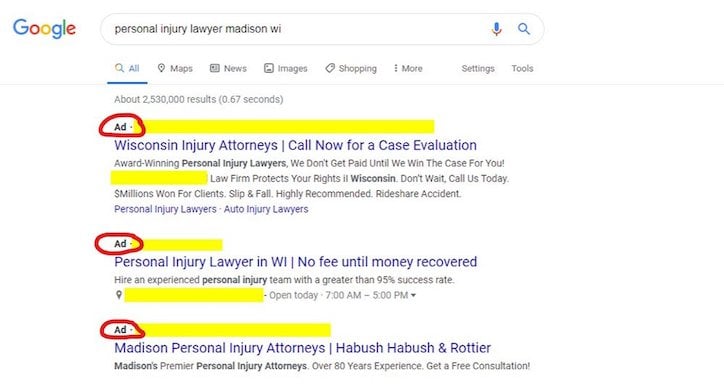
However, your ads’ “quality score,” can also affect how high and how often you’re able to rank, and how much you have to pay for those appearances. This score is Google’s measure of: 1) the quality of your ad, and 2) the relevance of your ad, target keyword, and landing page to the searcher’s query.
Factors that affect your quality score include:
- Expected click-through rate: how likely is the searcher to click on your ad?
- Ad relevance: how well does it align with the searcher’s questions?
- Landing page experience: how well does the page your searchers land on after clicking on your ad: 1) provide a solid user experience, 2) align with the content of the ad that sent users there, and 3) satisfy the intent behind the keyword the user searched for?
- Google Ad history: how well have your ads performed in the past?
Depending on the amount you bid and your quality score, you may appear at the top of a page a certain percentage of the times a keyword is searched for, or not be able to compete at all.
Note that not all search results are PPC ads. A certain number of results on each page are unpaid. These are called “organic” listings, and appear due to Google’s ranking algorithms without bidding.
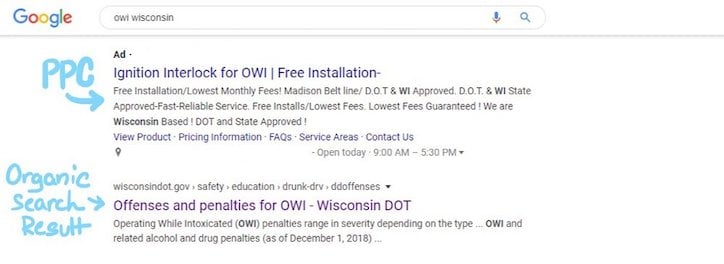
Let’s say you win the bid for the keyword “owi Wisconsin” at a particular moment, and that your ads have a high quality score for that keyword. When someone in Madison who has been arrested for a OWI Googles “owi Wisconsin,” chances are the first thing they will see on the result page is your business.
Key Takeaways
- PPC is a marketing strategy in which businesses pay to have their ads appear on the first page of Google by bidding on keywords.
- Some law firms use PPC to get in front of potential clients who are actively searching for legal services.

The advantages and disadvantages of PPC
Many lawyers use different channels—such as Search Engine Optimization (SEO) and referrals—to attract leads. PPC is not for everyone. However, it can be a great tool for law firms looking for cases involving individuals, such as criminal defense, OWI, and personal injury cases.
Advantages of PPC
- Fast results: As soon as you get your ads set up, they begin to appear in search results.
- Easy to reach potential clients: This method makes it easy to reach people who are looking for services like yours.
- Trackable: With PPC, you can track how well your ads are performing and adjust them to perform better.
- Accurate: You get to choose which keywords your ad will appear for.
Disadvantages of PPC
- Cost: It can get expensive, depending on the keywords you buy, and there’s a risk of getting a low return on investment. For example, if you’re a Madison law firm investing in a general keyword like “criminal defense,” more lawyers may be competing for it, therefore making it more expensive.
Plus, law-related keywords are often more expensive to begin with, since the searcher wants to solve an urgent problem immediately and law firms can potentially make a lot of money from one searcher becoming a client. For example, according to Ahrefs data, the keyword "car accident lawyer" costs $170 per ad click. - Competitive: Competition for keywords is particularly fierce in the legal industry, and other lawyers in the area can rank higher if they have more money to invest.
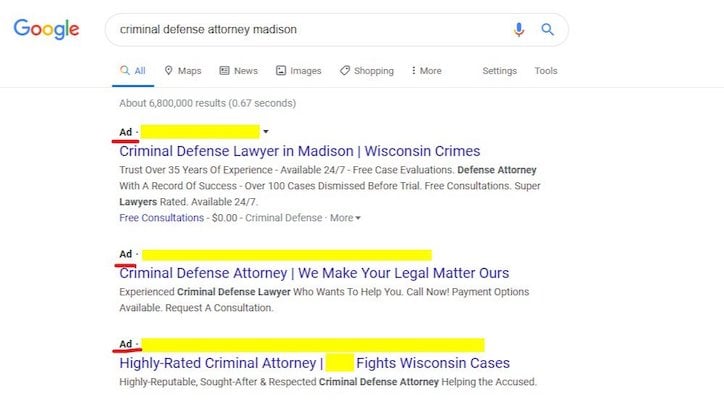
- High-maintenance: A PPC campaign requires frequent adjustments, such as getting rid of ineffective keywords and testing new ads.
- Short-term investment with short term gains: It’s relatively easy to set up a campaign and start driving traffic, but you can only maintain that traffic flow if you keep investing money. This is in contrast to SEO, which requires up-front investment but can drive traffic long-term without needing to make continuous payments.
Key Takeaways
- PPC can provide fast results, is easy to track, and adjusts to fit your needs. If your clients use Google search, it’s also an easy way to put ads in front of people who may already be searching for legal services.
- PPC can be expensive and competitive, and requires maintenance and an ongoing investment. Some consumers may avoid PPC ads because they are wary of advertisements.
How to create a cost-effective PPC strategy for your law firm
Before you launch into your first paid search campaign, you will want to create a plan and take stock of your resources.
Planning your law firm's PPC campaign: step by step
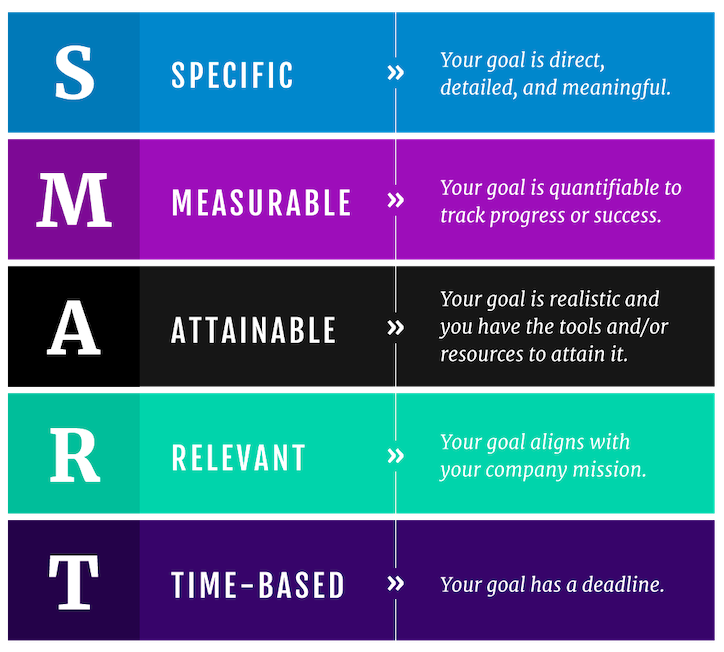
Step 1: Make specific, “smart” goals for your PPC campaign.
Have you set goals? Before you launch your campaign, come up with specific, measurable, attainable, relevant, and time-based (SMART) goals. For example, maybe you want more to generate a certain number of personal injury case leads within the next quarter.
Step 2: Determine the scope of your PPC campaign.
Is PPC the best strategy for achieving your goals? Paid search tends to work best for law firms that serve a broader client base of mostly individuals who are likely to search for an attorney on Google. If your clients don’t typically use search to find your business, you may want to consider sinking your resources into other methods.
For example, general practice lawyers and criminal lawyers tend to serve individuals who might search for keywords like “criminal lawyer Madison WI” in order to find an attorney. This gives law firms who specialize in these areas the opportunity to put advertisements in front of potential clients who are looking for their services.
On the flip-side, pay per click may be a less effective strategy for law firms who serve very specific markets who are more likely to look for a law firm through an alternative method. When deciding whether pay per click is the best strategy for you, consider how your customers typically find you.
Will PPC be your primary marketing strategy? Law firms can use a combination of paid search and other methods, such as SEO (search engine optimization) which focuses on ranking for organic, unpaid search results. We cover SEO later in this article.
How long will your PPC campaign be? Because of their expense and short-term results, PPC campaigns typically have a defined beginning and end in order for firms to assess whether or not they got a good return on their investment.
Step 3: Consider your buyer.
Who buys your services? Understanding the types of people who hire you can help you choose which keywords they are most likely to click on. A buyer persona is a fictional representation of your average customer.
It includes information like your average customer’s research and buying habits, and critical factors that affect their buying decisions, like cost.
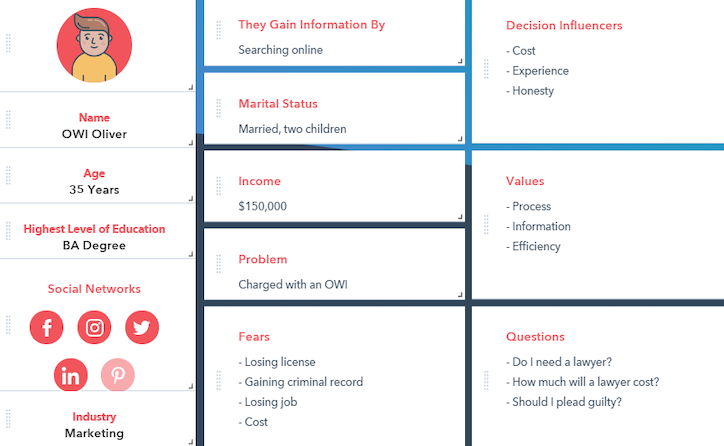
You may have more than one average type of customer, depending on your law firm’s specialty, and may need to make more than one buyer persona as a result.
For example, maybe you’re a general practice lawyer and you handle both divorce and estate planning cases. Your customers for each area of law may have different backgrounds, pain points, and buying habits. If you’re not sure where to start, check out this blog post.
Step 5: Check your tech.
Do you have access to your website’s content management system (CMS)? A CMS is an application that allows you to manage web content, such as web pages. Make sure you are able to edit the existing pages of your website and add new ones. This is because you will want to create new, dedicated landing pages for your PPC ads.
Are you able to quickly follow up with leads? People who need legal help sometimes contact multiple firms. Respond quickly to messages from potential clients before your competition does.
Key Takeaways
- Before launching your PPC campaign, set goals, know who your best customers are (personas), and take stock of your website.
- Consider whether PPC is the best strategy for your practice area before investing the time and money.
Launching your PPC campaign
Now that you’ve completed the prep work, you’re ready to decide which keywords to bid on in order to achieve your goals.
Step 1: Choose your keywords.
Identify the most important topics and keywords, with your SMART goals in mind. What types of cases are the most valuable to you? For example, maybe your firm represents family law cases, and you want more divorce cases. What topics does your persona search for when they’re facing a divorce case?
If your law firm is in Janesville, WI, then maybe your persona would be searching for “Janesville family lawyer,” or “divorce lawyers near Janesville WI.” In that case, you may be most successful bidding on those keywords.
Narrow down which keywords to bid on. You can choose whether to bid manually or choose from one of Google Ads' smart bidding (automated) options.
If you're bidding manually, it’s often best to bid on the most specific keywords where the searcher indicates that they are ready to make a purchase. Let’s go back to our previous example of the Janesville family law firm.
The keyword phrase “divorce lawyers near Janesville WI” is specific (family law, divorce, Janesville WI). It also implies that the person searching for this wants to find a lawyer located near Janesville who handles divorce cases.
If one of your goals is to get more divorce cases, then bidding on this keyword for your divorce ad set may increase the likelihood of getting clicks. Plus, very specific keywords often attract fewer competitive bids, and can therefore be cheaper to bid on than broader keywords.
For example, a keyword like “family lawyer” may cost more money to bid on than "divorce lawyers near Janesville WI" since the former is less specific.
Rather than investing a lot of money in your campaign right away, start with your best keywords and see how well ads for those keywords perform. Google Keyword Planner is a great tool for keyword research.
Step 2: Set up your Google Ads campaign.
Choose your campaign settings carefully.
Google provides many settings that help you tailor your ads to match your goals and target your personas.
For instance, when you first create a campaign, you'll want to explicitly define which specific geographic areas you want your search ads to appear in. Campaign settings also control things like budgeting, the start and end date of your ads, the language(s), and more.
Step 3: Create ad sets.
Create an ad group for each set of keywords. You’ve identified which topics are the most important to you and which related keywords you would like to bid on. Now, create an ad group for every related set of keywords. When someone searches for one of the keywords out of this group, one of the connected ads may appear.
Let’s say one of your firm's areas of focus is personal injury cases. You might group keywords like “personal injury lawyer," "work accident attorney Madison," and "best law firms for personal injury” into a single ad group. By doing so, your connected ads will be eligible to appear for any of these keyword variants.
Write compelling ad copy. Instead of using the same ad copy for every ad in a set, tweak the copy to make each one unique. You should write at least three ads per set, in order to maximize the possibility that one or more of your ads will perform well. Google typically serves top performing ads more often.
Ads that are brief, emotionally-charged, personal, offer benefits to clicking, and promise to solve the searcher’s problem tend to be more effective. They also speak to where a searcher is in their buying process. Check out this blog post for tips on writing your PPC ads. This post from Google is also a great resource.
Create a new landing page on your website for each ad set. You want to send potential customers to a landing page (the web page they arrive on after clicking on your ad) that is relevant to their search term.
For example, say you are a general practice lawyer who represents both personal injury and criminal law clients. You have an ad set targeting each of these personas.
If a potential customer searches for “personal injury lawyer Madison,” you should send them to a landing page that offers a free consultation with a “personal injury lawyer.” You can create another landing page tailored to people looking for criminal lawyers by offering a contact form that offers a free consultation with a “criminal attorney.”
Users are more likely to complete the next action you want them to (such as filling out a form or giving you a call) on landing pages relevant to their search.
Plus, landing page experience is one of the ways that Google judges the quality of your ads, so it can directly impact the success of your campaign.
You should also keep the design of these landing pages clean and simple to create a great user experience that will keep potential clients on your page and encourage them to convert.
Alternatively, you can now include a lead form in your ad by adding one to your campaign.
Step 4: Adjust your ads.
Try extensions. If you provide Google with additional information about your law firm, such as your location, phone number, or a link to your website, they will sometimes display this information in your ad. These are called ad extensions.
Google typically includes extensions when your Ad Rank (how well your ad performs and fulfills Google’s standards of excellence) is high enough, or when Google calculates that showing extensions will improve your ad’s performance (Google). Adding extensions does not cost extra, and may help increase the number of people who click on your ad.
Make bid adjustments. Bid adjustments allow you to change the amount you bid on keywords based on certain factors, such as the geographic location of the searcher, the device they are using, or the time of day that they are viewing your ad, among others.
Bid adjustment eligibility based on campaign type
If you know that searchers frequently find and contact your law firm while they’re out and about on their phone, then you might want to bid more money on mobile device clicks than desktop computer clicks. This could increase the number of times your ad appears on a mobile device.
At this stage, it may be in your best interest to make bid adjustments based on hypotheses backed up by hard facts. For example, if you know that people tend to look for information about sentencing and punishments after working hours, then you might want to increase the amount of your bid by 20% for clicks between 5 and 10 p.m. Want more details on how bid adjustments work? Check out Google’s help page.
Key Takeaways
- Start by identifying and bidding on a few highly-relevant keywords. Highly-relevant keywords tend to be specific and imply that the searcher is actively looking for legal services, like “estate planning lawyers near madison wi.”
- Create a specific landing page for each ad set that matches what that visitor was searching for or adding a lead form to your campaign.
- Use bid adjustments and ad extensions to optimize the performance of your ads.
Managing your PPC campaign
You’ve launched your pay per click campaign. Your ads are running, and they’re sending searchers to specialized landing pages on your website or collecting leads from form submissions. You’ve made adjustments to your bids to try to send potential clients to your website. Next up: tracking progress toward your goals and adjusting accordingly.
Step 1: Cut the dead wood.
Weed out keywords that don’t work. Some keywords will likely perform better than others. Sometimes they get strange results that are irrelevant to your ideal customer, or they simply don’t bring in enough leads for their cost.
For example, maybe you bid on the keyword “Wisconsin estate planner” but only got a few clicks with no conversions. In either case, stop bidding on keywords that don’t work. Instead, focus your energy on keywords that are helping you achieve your goals.
Step 2: Adjust your ads again.
Make more bid adjustments. Since you launched your PPC campaign, you’ve been gathering data every time someone clicks on your ads. You’ve had a chance to test your hypotheses and see if they hold up. Now, fine-tune your bids again now that you have some hard evidence. Note that if your campaign is very small and/or your budget is very limited, it might take a while to get enough data to make an informed decision.
Take Google’s advice. Google often gives feedback about your campaign to make it better. Since it is in Google’s best interest to help you, it’s usually wise to take their advice.
Key Takeaways
- Further optimize ad performance by getting rid of ineffective keywords, making ongoing bid adjustments, and following Google’s advice.
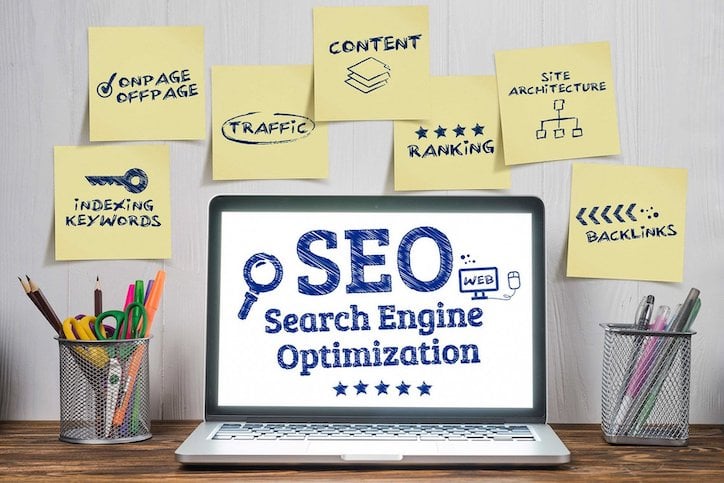
SEO: an alternative to PPC
There are a few supplements and alternative strategies to paid search, including referrals and retargeting campaigns, but we’re going to focus on SEO. This is because, like PPC, it can drive search traffic to your site and generate leads from people who are actively looking for your help.
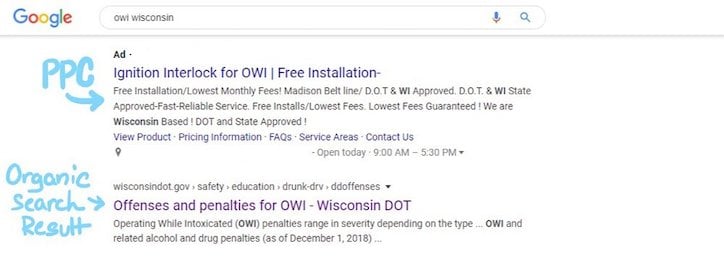
SEO (search engine optimization) for law firms
What is SEO?
SEO stands for “search engine optimization.” Like PPC, it targets certain keywords, keyword phrases, and topics in order to appear high on result pages. Unlike PPC, you do not pay to appear in search results. Instead, Google’s algorithm judges your content and assigns it a rank based on a number of factors.
Your goal is to produce content that pleases both readers and Google’s algorithm in order to earn a place at the top of the organic search results. A high search rank gives you greater visibility and may increase traffic to your site.
Typically, Google rewards content that is high quality, informative, and provides the searcher with the information they were looking for. Google also rewards a solid user experience, such as a safe, easy to navigate, up-to-date, visually appealing website. Some factors that can affect search rank are:
- Site security: is information on your site protected from hackers?
- Page speed: how fast do your web pages load?
- Mobile design: Does your site look great on any device?
- Site authority: how well-established is your site, and how authoritative is your host?
- Optimized content: is your content well-written, thorough, containing relevant keywords, and answering the questions your users ask?
- Technical SEO: is your site easy for search engine crawlers to read, navigate, and file?
- Great metadata: have you included keywords in your metadata, such as title tags and meta descriptions? Searchers may be more likely to click on your result if the metadata is compelling.
- High-quality links: have other trustworthy websites linked to your content?
Consistent, authentic business information: have you provided the same up-to-date contact information for your business throughout your site, such as your business’s name, address, and phone number? Is this information consistent with what appears on other websites, such as Yelp, Google Maps, and other local directories?
If you’re an SEO beginner and want to learn more, check out our guide to modern search engine optimization.
How SEO works
Let’s say you’re a criminal defense law firm in Madison, WI, who wants to bring in business by investing in content for organic search. Since you have a lot of experience with felony cases, you Google a phrase that your ideal client—someone who has just been suspected of a felony—might search for.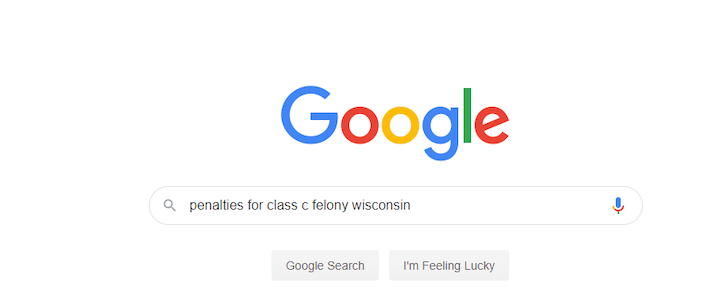
When you Google the phrase yourself, you look below the PPC ads at the organic listings. The highest ranking organic results are not that great. Maybe they’re vague and short, or not relevant to Wisconsin. This is your opportunity to write something better, and hopefully rank higher.
You write a blog post that hits on all cylinders. It checks all of the boxes described in the previous section. For example, it contains relevant keywords, like “class c felony,” “Wisconsin,” “penalties,” and similar keywords like “sentencing,” in a way that doesn’t seem unnatural or annoying to the reader. It answers the reader’s question thoroughly and provides links to other helpful, relevant content which satisfies the user’s search intent (another ranking factor).
Congratulations, your blog post has has a chance to attract potential clients to your site.
Unlike PPC ads, there’s no guarantee that you’re going to end up at the very top of the page. However, where paid search ads will stop sending traffic the minute you stop paying for them, SEO-optimized content can drive qualified traffic for months and even years to come.
Read how our SEO strategy generated leads for a Madison law firm in this case study.
Key Takeaways
- SEO (search engine optimization) is a strategy that businesses use to create web content that pleases both readers and Google’s algorithm. The goal of SEO is to draw highly-qualified visitors to your site: those who may become sales leads.
- SEO strategy focuses on factors that Google’s ranking algorithms (and typically, readers) favor in web content, such as depth of information, site security, page loading speed, the date it was published, and how well it matches what the reader searched for.
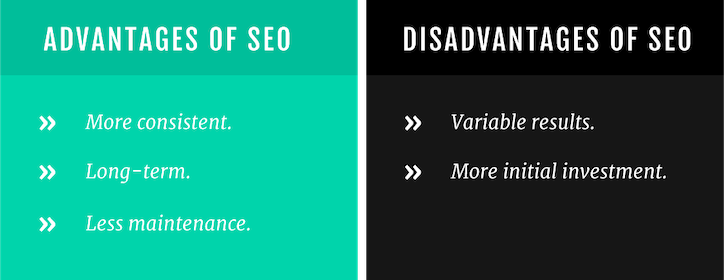
Advantages of SEO
- More consistent. You may be able to show up every time a user searches for your target keyword(s).
- Long-term. You don’t have to pay for clicks, and when done properly, you can bring in traffic for months or even years. This can result in passive, long-term lead generation.
- Less maintenance. While it is wise to update old content in order to provide the best, most relevant user experience possible, you don’t have to make adjustments every week or month.
Disadvantages of SEO
Variable results. Some content may achieve search rank and bring in many potential clients, while other content may not rank and bring in any new business at all.
More initial investment. An organic search strategy typically takes longer to set up than a PPC campaign, because it relies on solid web development, research, copywriting, and design.
Focusing on organic search may be worth the work depending on how competitive PPC is in your area, as was the case with our client.
Key Takeaways
- When done properly, SEO-optimized content may show up every time someone searches for a particular keyword.
- SEO does not require ongoing investment or frequent maintenance, and can potentially bring traffic to your site over months or even years.
- SEO takes time to set up and has variable results. Some content may draw lots of traffic, while other content may not draw any.
How to decide which strategy is best for you
Achieve strategic harmony.
Generally it makes sense to go after different things with pay per click and search engine optimization. For example, you can target valuable keywords with organic search that are too expensive to bid on while going after affordable keywords with PPC.
Assess the quality of the existing unpaid (organic), first page listings for a keyword you would like to target. If the competition is stiff, you may want to invest in paid search.
You can also test which strategies work best based on the data you gather in Google Analytics by looking at the “source” data of the site visit, which will tell you how many visits and leads you got from each channel (PPC and SEO).
There is one situation, however, where you may want to invest in both PPC and SEO channels for the same keyword: when your competitors bid on keywords that include your brand name.
These are keywords that you almost certainly already rank for in organic search results, since they include your business’ name. If you find your competitors are using PPC to show up in those results too, it’s generally best to bid on those keywords in order to outrank your competitors in the paid results.
To learn more ways you can boost your law firm’s digital marketing strategy, check out our law firm marketing plan.
Key Takeaways
- If you want to practice both PPC and SEO, target different keywords (except for branded keywords like the name of your business).

Partnering with a PPC agency
Should I hire an agency or run the campaign myself?
Whether you should hire an agency for your PPC campaign depends on your background, the size of your firm, and the resources you have available. Often, the more successful you are at marketing and the more leads you aquire, the more marketing competes with handling your caseload.
If you belong to a large law firm with a marketing department, have a full-time marketer on staff, or have a background in marketing, then you may be able to handle this in-house.
However, if you are a small law firm and do not have someone on staff who can market full-time, you may want to hire an agency. Before approaching a potential PPC partner, make sure your firm has defined goals for this campaign such as increasing revenue, generating leads, or getting more cases in a certain area.
Questions to ask a potential lawyer PPC partner
- How do we develop a strategy?
- What am I doing right? What am I doing wrong? How might PPC complement my strengths and help me work on my weak areas?
- Do you have any relevant case studies I could look at? (Ideally, the goal(s) of the company profiled in the case study align with your own.)
- What is your plan for managing my campaign after set up? How will we improve results over time?
- Can you provide regular reporting that shows ROI and/or progress toward my goals?
- Does your agency have a successful track record working for businesses in the legal field?
How much does a PPC campaign cost for lawyers? What’s included?
At this point, you’re probably wondering what a pay per click campaign will cost. There are typically three components that agencies and freelancers charge for: strategy, set up, and ongoing optimization.
Most marketers charge by the hour, or by flat fee. When you pay marketers to create a PPC campaign for you, they are typically charging for three stages of service: strategy, set up, and optimization. In order to provide you with an overview of what to expect, here are some rough estimates, from the least number of hours to the most hours each stage typically takes.
Strategy: 0–20 hours
Some agencies charge a strategy fee, while others do not. If there is no strategy fee and the agency does not convey their findings with you in a report or presentation, make sure the agency effectively communicates their strategy before you sign on with them long-term.
Strategies generally involve researching competitors and evaluating the search environment. Paying for such services often means that you are getting in-depth research tailored to your situation. Some agencies who offer it for free may skimp on the details and offer a more generalized approach.
Setting up a campaign: 3–30 hours
Working with a freelancer might cost less than a full service agency, but you want to make sure that the person setting up your campaign is an expert at paid search.
Campaign set up typically involves keyword research, designing campaigns in Google Ads, writing ads, and integrating analytics so that you can track ad performance. Keyword research and copywriting can be particularly time consuming, so this process can take many hours.
Ongoing optimization: 1 hour per month–continuous
PPC campaigns need maintenance, such as cutting ineffective keywords and making bid adjustments. The monthly fee for these services is typically less than setup. The smaller your campaign, the less frequently you will need to tweak it, since you may not have enough data to make informed adjustments every week.
For very low-budget campaigns, it may take half an hour to an hour per week to make bid adjustments, regularly test new ad copy, etc. If you have a big budget and large campaign, you can theoretically make adjustments around the clock. It all depends on the size of your law firm, your campaign, and your budget.
When looking for an agency, make sure that they are willing to maintain and optimize your campaign.

Our approach to PPC
At Madison Marketing Group, we tailor our search strategy to suit each client’s situation by examining their entire search environment, performing in-depth keyword research, and recommending a strategy that works best for them.
Next steps
Designing and maintaining a great law firm PPC campaign in such a competitive search environment can be an art form onto itself, and may take years of practice to perfect. When you have a full caseload and court visits scheduled, you may not always have time to mess around with keyword research and bid adjustments.
The more successful your pay per click or search engine optimization campaign, the more leads you generate, the more time you spend following up with leads rather than focusing on your duties as an attorney.
To learn more tips for marketing your law firm, check out our free guide.

-1.jpeg?width=724&name=_payper-clcksign-2556956%20(1)-1.jpeg)

